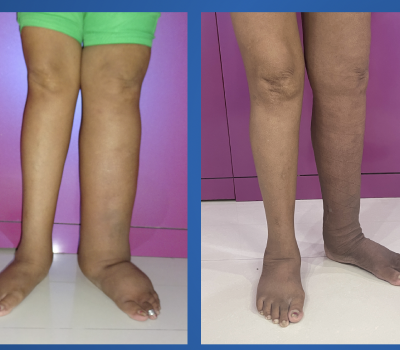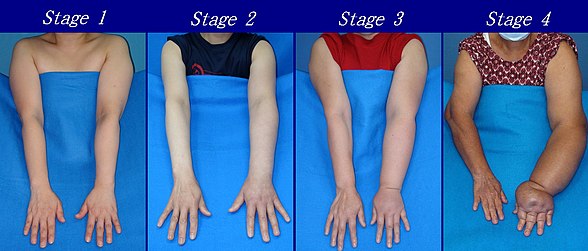Lymphedema Lymphedema
What is lymphedema?
Lymphedema is a chronic lymphatic condition that causes unsightly swelling in one or more body areas. It might be inherited (Primary Lymphedema), or it can develop as a result of surgery, illness, radiotherapy, or other physical stress (Secondary Lymphedema).
Lymph plays an important role in the human body. It transports foreign objects and germs away from your skin and body tissues, as well as infection-fighting cells from your immune response.
What Are The Causes of Lymphedema?
Lymphedema develops when the body’s lymphatic system is clogged, usually due to obstruction in a lymph channel. Swelling is caused by the accumulation of lymphatic fluid beneath the skin. Lymphedema usually affects the legs or arms.
What Are The Types of Lymphedema?
There are Mainely Two Types of Lymphedema:-
1) Primary Lymphedema.
2) Secondary Lymphedema.
1)Secondary Lymphedema:-
The lymphatic system has been harmed, resulting in a temporary or permanent blockage of lymph flow. This condition is known as secondary lymphedema.
Common Causes of Secondary lymphedema:-
- Surgical damage
- Infection in lymphatic vessels
- Radiation therapy for cancer
- Cancer
2)Primary Lymphedema:-
Primary lymphedema develops when lymphedema develops without any documented injury or illness.
Common Types Primary lymphedema:-
- Age 36 and older
- After birth but before age 36
- At birth.
What is the most common symptom of lymphoma?
- Lymph nodes in your neck enlarge without pain.
- Persistent fatigue.
- Fever.
- Night sweats.
- Shortness of breath.
- Unexplained weight loss.
- Itchy skin.
What Is the most common treatment for Lymphedema?
- Therapy for Lymphedema:-Lymphedema treatments is determined by the degree and scope of the problem. Because there is no treatment for lymphedema, prevention, and management of the condition are critical.Some lymphedema therapists Like:-
- Wearing a customized Bandage
- Applying Regular Arm pump
- Eating a well-balanced diet
- Keep the arm raised.
- Infection Prevention
Lymphedema Surgery
- Surgical surgery may be considered once edema has advanced to phases 3 or 4. Lymphedema surgery can entail a variety of procedures.: –
- Lymph node transplant
- New drainage paths
- Removal of fibrous tissue
- Liposuction
Request A Call Back



